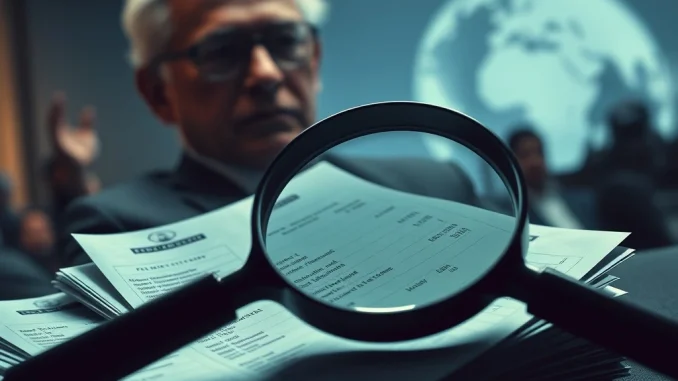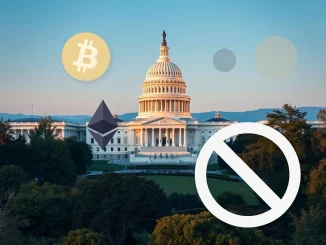
In an era where trust in institutions is constantly scrutinized, news of a significant WEF probe into its founder, Klaus Schwab, sends ripples across global financial and political landscapes. For those navigating the volatile world of cryptocurrencies, understanding the integrity of traditional power structures, like the World Economic Forum, is crucial. This investigation, uncovering over $1.1 million in questionable expenses, not only threatens a legacy but also highlights broader concerns about accountability at the highest levels.
The Shocking WEF Probe: Unveiling Questionable Expenses
A preliminary investigation has cast a long shadow over the World Economic Forum (WEF) and its long-standing leader, Klaus Schwab. Conducted by the Swiss law firm Homburger, and initiated by the WEF’s board of trustees, this probe follows whistleblower complaints that raised serious questions about financial conduct and personal ethics. The findings point to more than $1.1 million in expenses billed to the WEF that are now under intense scrutiny.
The gravity of these allegations led to Schwab stepping down as board chair in April, a significant move for a figure who has been at the helm of the WEF since its inception in 1971. The ongoing investigation is expected to conclude by August, and its outcome could profoundly impact the future direction and public perception of one of the world’s most influential global organizations.
Who is Klaus Schwab and Why Does This Matter?
Klaus Schwab is the visionary founder of the World Economic Forum, an organization that has for decades served as a premier platform for global leaders, policymakers, business executives, and academics to discuss and shape global agendas. From its humble beginnings in 1971, Schwab transformed the WEF into a powerhouse, known for its annual Davos summit where critical discussions on economics, technology, and societal challenges take place.
The WEF’s influence extends to discussions around global finance, regulation, and technological innovation, all of which indirectly affect the broader crypto ecosystem. The integrity of such an institution is paramount for maintaining confidence in global governance. Therefore, any allegations of financial impropriety against its founder can erode public trust, not just in the WEF itself, but in the broader landscape of traditional financial and political leadership. This investigation is not just about expenses; it’s about the perceived ethical standing of an institution that champions global cooperation and good governance.
Deep Dive into Questionable Travel Expenses: A Closer Look
The core of the financial allegations centers on extensive travel expenses incurred by Klaus Schwab and his wife, Hilde. Investigators have flagged over $1.1 million, including first-class airfares for trips that appear to have minimal connection to official Forum activities. Here’s a breakdown of some key findings:
- First-Class Travel: A significant portion of the flagged expenses relates to first-class tickets for Schwab and his wife, Hilde. While Schwab’s role as founder and executive chairman often necessitated travel, the nature and frequency of some journeys are under review.
- Exotic Destinations: Trips with Hilde Schwab to locales such as Venice, Miami, the Seychelles, and Morocco (a late 2024 to early 2025 trip) are being questioned. Hilde Schwab holds no formal role at the WEF, yet her travel was often billed to the organization. Investigators found little evidence directly linking these particular journeys to official Forum activities.
- Personal Amenities: Beyond travel, the probe also highlighted expenses like 14 hotel massages, the consistent use of a WEF-paid driver, and phone expenses for their Geneva residence. Schwab’s spokesperson defended these, citing security concerns and the necessity of hosting WEF-related events at their home.
To summarize the core financial concerns:
| Expense Category | Specifics Flagged | Schwab’s Defense/Explanation | Investigator’s Observation |
|---|---|---|---|
| Travel Expenses | Over $1.1M in first-class tickets for Klaus & Hilde Schwab, including trips to Venice, Miami, Seychelles, Morocco. | Justified due to security concerns and WEF-related activities. | Minimal evidence linking some journeys to Forum activities. |
| Personal Services | 14 hotel massages, WEF-paid driver, phone expenses for Geneva residence. | Security reasons; residence used for WEF hosting. | Flagged as questionable use of WEF funds. |
Beyond the Numbers: Allegations of Ethical Violations
The investigation extends beyond mere financial discrepancies to include serious allegations of personal conduct and ethical violations. These touch upon the use of WEF assets and the handling of gifts:
- Villa Mundi Use: Scrutiny is focused on Villa Mundi, a Lake Geneva property owned by the WEF. Investigators allege that Schwab and Hilde oversaw costly interior renovations by a firm previously engaged for their personal projects. Furthermore, Hilde Schwab reportedly utilized the villa privately. The Schwabs have denied orchestrating the design work or using the villa for personal events.
- Gift Policy Breaches: The probe also cited the receipt of gifts, including Russian tea sets and fur coats, as potential violations of WEF policy. Schwab’s spokesperson stated that most gifts were either donated or displayed at WEF headquarters, suggesting adherence to protocol.
Klaus Schwab has consistently denied any wrongdoing, asserting a “good-faith understanding” between the WEF and the Schwab Foundation, an affiliated nonprofit led by his wife. He has publicly committed to reimbursing any personal expenses identified by the investigation. However, Schwab has also accused the WEF board of breaching confidentiality by reporting the preliminary findings, declaring himself “deceived” and vowing to legally defend his reputation.
What’s Next for the World Economic Forum?
The board of trustees of the World Economic Forum has acknowledged the gravity of the allegations but has refrained from commenting on specific details. They emphasize the need for Homburger’s investigation to remain independent and thorough, pledging to assess the findings without external media speculation. This measured response underscores the delicate balance the WEF must strike between transparency and maintaining the integrity of the investigative process.
The timeline for the investigation’s conclusion, expected by August, aligns critically with preparations for the 2026 Davos summit. The outcome will undoubtedly shape the Forum’s reputation and its ability to attract and influence global leaders in the years to come. The stakes are high, not just for Klaus Schwab’s legacy, but for the credibility of an institution that plays a significant role in shaping global discourse.
Conclusion
The ongoing WEF probe into Klaus Schwab’s questionable expenses and alleged ethical violations marks a pivotal moment for the World Economic Forum. While the investigation is still underway, the preliminary findings have brought unprecedented scrutiny upon its founder and operations. This situation underscores the critical importance of transparency and robust governance, even for the most established global institutions. As the world awaits the final report, the integrity of the WEF and its future standing on the global stage remain under a powerful spotlight. The resolution of this matter will not only define Klaus Schwab’s legacy but also set a precedent for accountability within influential international bodies.
Frequently Asked Questions (FAQs)
1. What is the main allegation against Klaus Schwab?
The main allegation is that Klaus Schwab, founder of the World Economic Forum, incurred over $1.1 million in questionable travel expenses and engaged in other ethical violations, including the personal use of WEF assets and improper handling of gifts.
2. Who is conducting the investigation into Klaus Schwab’s expenses?
The investigation is being conducted by the Swiss law firm Homburger, commissioned by the WEF’s board of trustees following whistleblower complaints.
3. What specific expenses are being questioned in the probe?
Specific questioned expenses include over $1.1 million in first-class travel for Klaus Schwab and his wife (Hilde Schwab) to various destinations like Venice, Miami, Seychelles, and Morocco, along with hotel massages, a WEF-paid driver, and phone expenses for their Geneva residence. The use of the WEF-owned Villa Mundi for personal renovations and the receipt of certain gifts are also under scrutiny.
4. Has Klaus Schwab admitted wrongdoing?
Klaus Schwab has denied any wrongdoing, stating there was a “good-faith understanding” regarding expenses. He has pledged to reimburse any personal expenses identified by the investigation but has also accused the WEF board of breaching confidentiality.
5. How might this investigation affect the World Economic Forum?
The investigation could significantly impact the World Economic Forum’s reputation and credibility, especially as it prepares for the 2026 Davos summit. It raises questions about governance and accountability within the organization.
6. When is the investigation expected to conclude?
The investigation is expected to conclude by August 2025.



